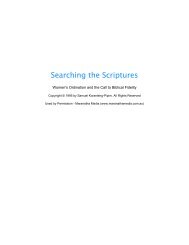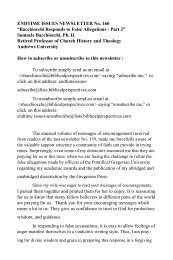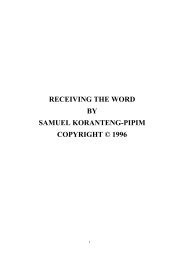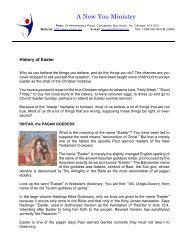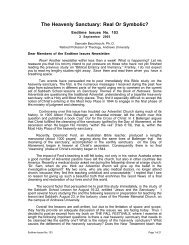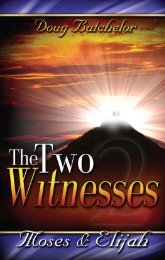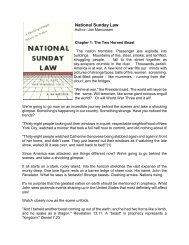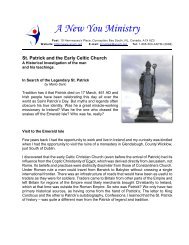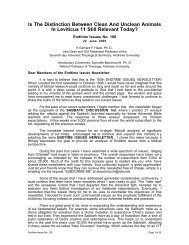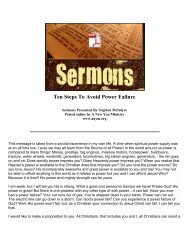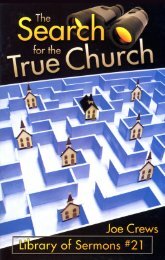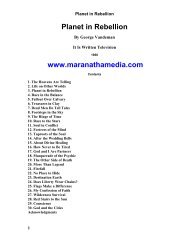Bible Readings for the Home Circleâ1914 - A New You Ministry
Bible Readings for the Home Circleâ1914 - A New You Ministry
Bible Readings for the Home Circleâ1914 - A New You Ministry
Create successful ePaper yourself
Turn your PDF publications into a flip-book with our unique Google optimized e-Paper software.
BIBLE READINGS<br />
THE BIBLE<br />
{13<br />
13}<br />
Its Origin, History, and Place in <strong>the</strong> World<br />
THE <strong>Bible</strong> contains proof in itself of its divine origin. No o<strong>the</strong>r book can<br />
answer <strong>the</strong> questionings of <strong>the</strong> mind or satisfy <strong>the</strong> longings of <strong>the</strong> heart as<br />
does <strong>the</strong> <strong>Bible</strong>. It is adapted to every age and condition of life, and is full of<br />
that knowledge which enlightens <strong>the</strong> mind and sanctifies <strong>the</strong> soul.<br />
In <strong>the</strong> <strong>Bible</strong> we have a revelation of <strong>the</strong> living God. Received by faith,<br />
it has power to trans<strong>for</strong>m <strong>the</strong> life. During all its history a divine watch-care<br />
has been over it, and preserved it <strong>for</strong> <strong>the</strong> world.<br />
How, When, and Why Written<br />
After <strong>the</strong> flood, as men became numerous, and darkness was again<br />
settling over <strong>the</strong> world, holy men wrote as <strong>the</strong>y were moved by <strong>the</strong> Spirit<br />
of God. Thus God spoke to His people, and through <strong>the</strong>m to <strong>the</strong> world,<br />
that a knowledge of God and of His will might not perish from <strong>the</strong> earth.<br />
For centuries this work went on, until Christ, <strong>the</strong> promised Seed,<br />
came. With Him, and <strong>the</strong> blessed message of light and salvation proclaimed<br />
by Him and by His apostles, <strong>the</strong> Scripture record closed, and <strong>the</strong> Word of<br />
God was complete.<br />
Original Writings and Translations<br />
The Old Testament Scriptures were first written in Hebrew, upon<br />
scrolls, or rolls of parchment, linen, or papyrus. These were later translated<br />
into Greek, <strong>the</strong> oldest translation being known as <strong>the</strong> Septuagint, or<br />
“Version of <strong>the</strong> Seventy,” made at Alexandria, <strong>for</strong> <strong>the</strong> Alexandrian Library,<br />
by a company of seventy learned Jews, under <strong>the</strong> patronage of Ptolemy<br />
Philadelphus, {14<br />
14} about 285 B.C. The original order <strong>for</strong> this translation is<br />
said to have been given by Alexander <strong>the</strong> Great, who previously, upon<br />
visiting Jerusalem in 332 B.C., had learned from <strong>the</strong> prophecy of Daniel<br />
that Grecia was to overthrow <strong>the</strong> Persian kingdom. See Josephus’s “Antiquities<br />
of <strong>the</strong> Jews,” book 11, chap. 8, par. 5. This was <strong>the</strong> version in<br />
common use in <strong>the</strong> time of Christ.<br />
The <strong>New</strong> Testament was all originally written in Greek, except Mat<strong>the</strong>w,<br />
which was first written in Hebrew, and later translated into Greek.<br />
At an early date, Latin translations, both of <strong>the</strong> Septuagint and of <strong>the</strong><br />
Greek <strong>New</strong> Testament, were made by different individuals, and <strong>the</strong> more<br />
carefully prepared Latin Vulgate of Jerome, <strong>the</strong> <strong>Bible</strong> complete, was made<br />
A.D. 383–405.<br />
THE BIBLE<br />
Printing and <strong>the</strong> <strong>Bible</strong><br />
Printing, however, being yet unknown, copies of <strong>the</strong> <strong>Bible</strong> could be<br />
produced only by <strong>the</strong> slow, laborious, and expensive process of handwriting.<br />
This necessarily greatly limited its circulation. Worse still, its illuminating<br />
and saving truths were largely hidden <strong>for</strong> centuries by <strong>the</strong> errors,<br />
superstitions, and apostasy of <strong>the</strong> dark ages. During this time <strong>the</strong> common<br />
people knew little of its contents. {15<br />
15}<br />
But with <strong>the</strong> invention of <strong>the</strong> art of printing about <strong>the</strong> middle of <strong>the</strong><br />
fifteenth century, and with <strong>the</strong> dawn of <strong>the</strong> great Re<strong>for</strong>mation in <strong>the</strong> century<br />
following, <strong>the</strong> <strong>Bible</strong> entered upon a new era, preparatory to <strong>the</strong> final<br />
proclamation of <strong>the</strong> gospel throughout <strong>the</strong> world.<br />
Not a little significant is <strong>the</strong> fact that <strong>the</strong> first book printed from movable<br />
type was <strong>the</strong> <strong>Bible</strong> in Latin, which came from <strong>the</strong> press of John<br />
Gutenberg, at Mentz, Germany, in 1456, a copy of which, in 1911, was<br />
sold in <strong>New</strong> York City <strong>for</strong> fifty thousand dollars, <strong>the</strong> highest price ever<br />
paid <strong>for</strong> a single book.<br />
The <strong>Bible</strong> in Native Tongues<br />
Thus far, however, <strong>the</strong> <strong>Bible</strong> had been published only in ancient tongues,<br />
now little understood by <strong>the</strong> common people. Without <strong>the</strong> Word of God in<br />
<strong>the</strong>ir hands, <strong>the</strong> good seed sown among <strong>the</strong>m was easily destroyed. “O,”<br />
said <strong>the</strong> advocates of its pure teachings, “if <strong>the</strong> people only had <strong>the</strong> Word<br />
of God in <strong>the</strong>ir own language, this would not happen! Without this it will<br />
be impossible to establish <strong>the</strong> laity in <strong>the</strong> truth.”<br />
And why should <strong>the</strong>y not have it in <strong>the</strong>ir own tongue <strong>the</strong>y reasoned.<br />
Moses wrote in <strong>the</strong> language of <strong>the</strong> people of his time; <strong>the</strong> prophets spoke<br />
in <strong>the</strong> tongue familiar to <strong>the</strong> men whom {16<br />
16} <strong>the</strong>y addressed; and <strong>the</strong><br />
<strong>New</strong> Testament was written in <strong>the</strong> language <strong>the</strong>n current throughout <strong>the</strong><br />
Roman world.<br />
The translation of <strong>the</strong> <strong>Bible</strong> into English by John Wyclif, in 1380, was<br />
<strong>the</strong> chief event in <strong>the</strong> beginning of <strong>the</strong> Re<strong>for</strong>mation. It also prepared <strong>the</strong><br />
way <strong>for</strong> <strong>the</strong> revival of Christianity in England, and <strong>the</strong> multiplying <strong>the</strong>re of<br />
<strong>the</strong> Word by <strong>the</strong> millions, <strong>for</strong> all <strong>the</strong> world, that has followed.<br />
To make such a translation at that time, says Neander, “required a bold<br />
spirit which no danger could appal.” For making it Wyclif was attacked<br />
from various quarters, because, it was claimed, “he was introducing among<br />
<strong>the</strong> multitude a book reserved exclusively <strong>for</strong> <strong>the</strong> use of <strong>the</strong> priests.” In <strong>the</strong><br />
general denunciation it was declared that “thus was <strong>the</strong> gospel by him laid<br />
more open to <strong>the</strong> laity, and to women who could read, than it had <strong>for</strong>merly<br />
been to <strong>the</strong> most learned of <strong>the</strong> clergy; and in this way <strong>the</strong> gospel pearl is<br />
cast abroad, and trodden underfoot of swine.” In <strong>the</strong> preface to his translation,<br />
Wyclif exhorted all <strong>the</strong> people to read <strong>the</strong> Scriptures.




